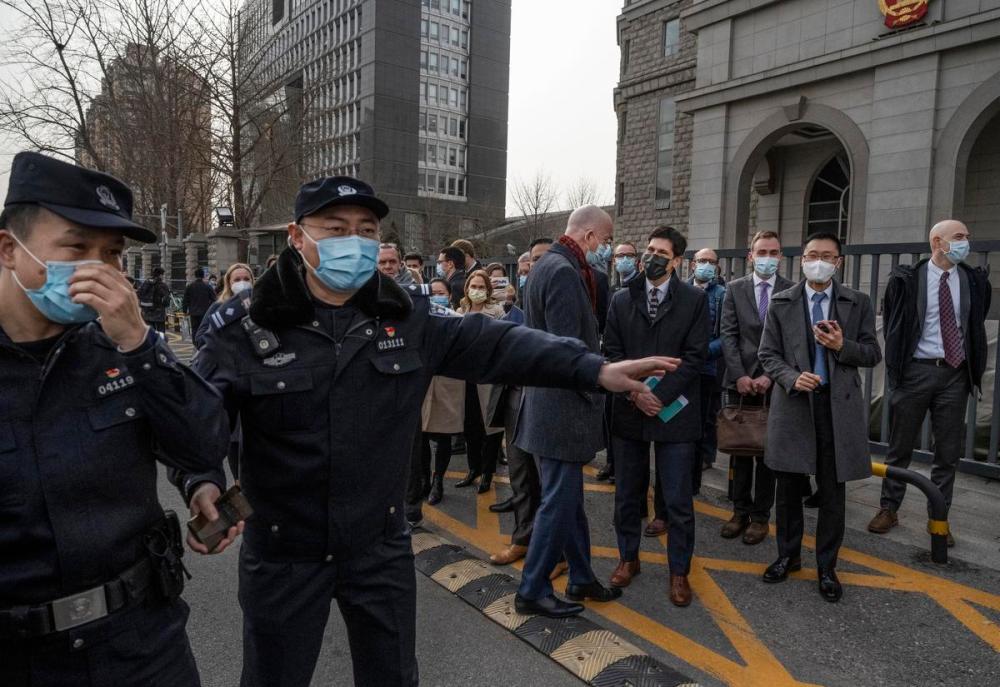Canada and its allies must match words with action in standing up to China
Advertisement
Read this article for free:
or
Already have an account? Log in here »
To continue reading, please subscribe:
Monthly Digital Subscription
$0 for the first 4 weeks*
- Enjoy unlimited reading on winnipegfreepress.com
- Read the E-Edition, our digital replica newspaper
- Access News Break, our award-winning app
- Play interactive puzzles
*No charge for 4 weeks then price increases to the regular rate of $19.00 plus GST every four weeks. Offer available to new and qualified returning subscribers only. Cancel any time.
Monthly Digital Subscription
$4.75/week*
- Enjoy unlimited reading on winnipegfreepress.com
- Read the E-Edition, our digital replica newspaper
- Access News Break, our award-winning app
- Play interactive puzzles
*Billed as $19 plus GST every four weeks. Cancel any time.
To continue reading, please subscribe:
Add Free Press access to your Brandon Sun subscription for only an additional
$1 for the first 4 weeks*
*Your next subscription payment will increase by $1.00 and you will be charged $16.99 plus GST for four weeks. After four weeks, your payment will increase to $23.99 plus GST every four weeks.
Read unlimited articles for free today:
or
Already have an account? Log in here »
Hey there, time traveller!
This article was published 22/03/2021 (1728 days ago), so information in it may no longer be current.
It was good to see representatives of two dozen countries joining with Canada on Monday to show their support for Michael Kovrig, the Canadian put on trial in China on trumped-up spy charges.
The diplomats marched along the sidewalk outside a courthouse in Beijing where Kovrig’s trial was being conducted in absolute secrecy. A couple of days earlier, in another Chinese court, another Canadian, Michael Spavor, was tried on similar charges. And again, in complete secrecy.
Demonstrating symbolic support for the ordeal undergone by the “two Michaels” is certainly a good thing.

But how much better would it be if the symbolism was matched by actual action? How much more effective would it be if those countries (and others) backed up their sentiments by taking concrete steps to show the Chinese government that its strategic hostage-taking will not be tolerated?
Unfortunately, though, the countries that paraded their support for Kovrig and Spavor aren’t doing that.
Nor do they, and the other countries that signed up to a Canadian-sponsored declaration against “arbitrary detention in state-to-state relations” as recently as Feb. 15, seem prepared to do more than be publicly annoyed at China’s government.
It’s all words, at least so far. The grandly named declaration against arbitrary detention, clearly aimed at Beijing, is toothless. It doesn’t require the countries that signed it to do anything at all.
It’s clearly time for Canada and other countries to pass from words to action when it comes to standing up to China. And, in fact, some of them are doing just that, but on an entirely different issue.
On Monday, even as Canada was blustering away at Beijing for going ahead with the secret trials of the two Michaels, Ottawa joined with the United States, Britain and the European Union in imposing sanctions on four high-level Chinese officials and a state agency to protest the treatment of that country’s Muslim Uyghur minority. Parliament has labelled it “genocide.”
So it can be done. China isn’t too big or too important to be spared sanctions by Ottawa — as long, it seems, as it’s part of a wider campaign orchestrated by our senior partners in Washington, London and Brussels.
But not, apparently, to pressure Beijing to free Kovrig and Spavor, imprisoned now for 833 days as retaliation for Canada’s detention of a Chinese telecom executive in Vancouver for possible extradition to the United States.
Ottawa has preferred the softly-softly approach for fear of making things worse for the two Michaels. But how much worse can it get? Imprisoned for more than two years; denied access to family and consular help; tried in secret without any evidence being made public. China has responded to Canada’s bend-over-backwards reasonableness with open contempt.
If the countries that supported the Canadians on Monday, and those that signed the declaration against arbitrary detention, were serious, they would join with Canada in imposing sanctions against Beijing to underline their opposition to this disgraceful behaviour. It’s easy for Beijing to dismiss Ottawa alone as a minor pest, but a coordinated campaign to free Kovrig and Spavor would sting.
Such a campaign might well target senior officials in China’s politicized judicial system. It might deny them and their families the right to travel abroad, including for education, or access financial assets outside China. And it might call into question participation in the summer Olympics scheduled for next year in Beijing.
For Canada, it should also include a fresh look at whether it’s worth being part of the Beijing-sponsored Asian Infrastructure Investment Bank.
The Trudeau government had Canada join the bank in 2016, at a time when hope still flourished that a new and more cooperative era with China was at hand. But China’s government has made that impossible. Under President Xi Jinping, it has threatened enemies and potential partners alike, cracked down on the Uyghurs and in Hong Kong, and generally shown it’s out to dominate, not cooperate.
Beijing’s treatment of the two Michaels is part of that pattern. Canada has no choice but to match its words of protest with action — and like-minded countries should join with it.


